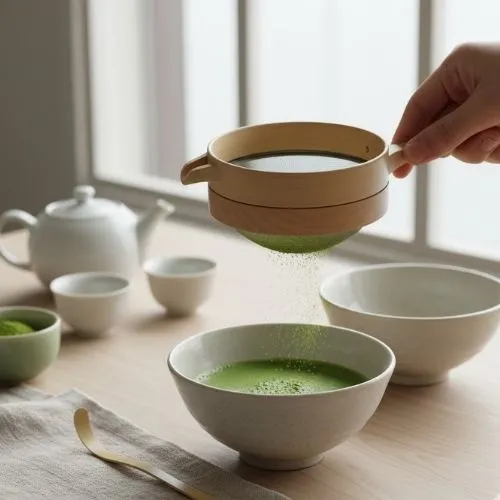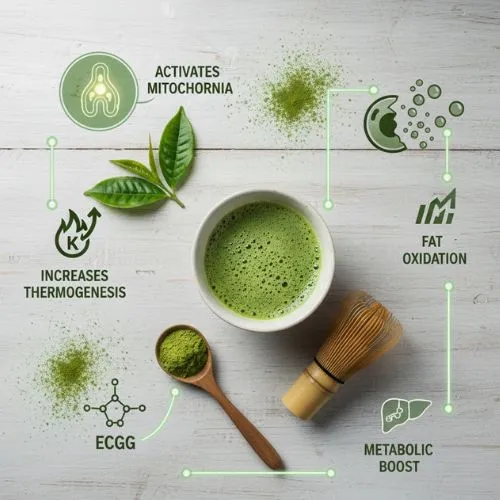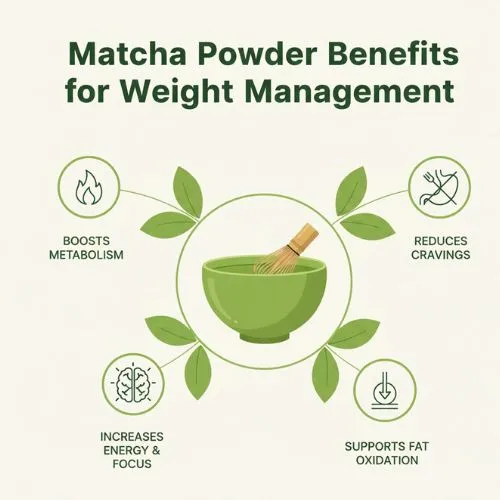Does matcha reduce belly fat?
Matcha, the vibrant green powdered tea, has gained immense popularity in recent years due to its potential health benefits. One question that often arises is whether matcha powder can help reduce belly fat. In this comprehensive guide, we'll explore the science behind matcha's fat-burning properties and how it can be incorporated into a healthy lifestyle for weight management.

How Matcha Powder Boosts Fat Metabolism?
The Power of Catechins
Matcha powder is rich in catechins, particularly epigallocatechin gallate (EGCG), which are potent antioxidants. These compounds have been shown to enhance fat oxidation and increase metabolic rate. A study published in the American Journal of Clinical Nutrition found that consuming green tea extract high in catechins led to a significant reduction in body fat, especially in the abdominal area.
Thermogenic Effect
The combination of caffeine and catechins in matcha creates a thermogenic effect in the body. This means it can temporarily increase your body's calorie-burning capacity. Research has demonstrated that this thermogenic effect can boost energy expenditure by up to 4-5%, potentially contributing to fat loss over time when combined with a balanced diet and regular exercise.
Appetite Regulation
Matcha may also help regulate appetite, which can indirectly contribute to reducing belly fat. The amino acid L-theanine found in matcha powder works synergistically with caffeine to provide a sustained energy release, potentially reducing cravings and preventing overeating. This appetite-suppressing effect can be particularly beneficial for those looking to manage their calorie intake and reduce abdominal fat.

Matcha Powder Benefits for Weight Management
Enhanced Fat Burning During Exercise
Incorporating matcha into your pre-workout routine may amplify the fat-burning effects of exercise. A study published in the Journal of Medicinal Food revealed that consuming green tea extract before moderate-intensity exercise increased fat oxidation rates by 17% compared to a placebo. This suggests that matcha could potentially enhance the effectiveness of your workouts, particularly when it comes to burning stubborn belly fat.
Improved Insulin Sensitivity
Insulin resistance is often associated with increased abdominal fat accumulation. Matcha's active compounds, particularly EGCG, have been shown to improve insulin sensitivity. A review in the Diabetes & Metabolism Journal highlighted that regular consumption of green tea catechins could lead to improvements in glucose metabolism and insulin sensitivity, which may contribute to better weight management and reduced belly fat.
Stress Reduction and Cortisol Management
Chronic stress and elevated cortisol levels can contribute to increased abdominal fat storage. Matcha contains L-theanine, an amino acid known for its stress-reducing properties. By helping to manage stress levels, matcha powder may indirectly support efforts to reduce belly fat. A study in the Journal of Physiological Anthropology found that L-theanine intake resulted in reduced stress responses to a cognitive stressor, suggesting potential benefits for stress-related weight gain.

Tips to Use Matcha Powder for a Flatter Belly
Optimal Timing for Consumption
To maximize matcha's potential fat-burning effects, consider consuming it at strategic times throughout the day. Having a cup of matcha tea in the morning can kickstart your metabolism and provide a gentle energy boost. Additionally, drinking matcha about 30 minutes before exercise may enhance fat oxidation during your workout. Experiment with timing to find what works best for your body and schedule.
Matcha-Infused Recipes for Weight Loss
Incorporating matcha into your diet doesn't have to be limited to tea. Try adding matcha powder to smoothies, yogurt, or oatmeal for a nutritious and metabolism-boosting breakfast. For a satisfying snack, blend matcha with Greek yogurt and freeze it into popsicles. These creative recipes can help you enjoy the benefits of matcha powder while supporting your weight loss goals.
Combining Matcha with a Balanced Diet
While matcha can be a valuable addition to your weight loss journey, it's essential to remember that it's not a magic solution. For optimal results, combine matcha consumption with a balanced diet rich in whole foods, lean proteins, and plenty of fruits and vegetables. This holistic approach will provide your body with the nutrients it needs while supporting fat loss efforts.

Conclusion
Matcha powder shows promising potential in supporting weight loss and reducing belly fat through its unique combination of catechins, caffeine, and L-theanine. By boosting metabolism, enhancing fat oxidation, and regulating appetite, matcha can be a valuable addition to a comprehensive weight management plan. However, it's crucial to remember that sustainable weight loss requires a holistic approach, including a balanced diet and regular physical activity.
Ready to incorporate high-quality matcha powder into your wellness routine? At Yangge Biotech Co., Ltd., we specialize in premium matcha powder production. Our matcha is carefully sourced and processed to ensure maximum nutrient retention and efficacy. Whether you're a health-conscious individual or a food and beverage manufacturer looking to create innovative matcha-infused products, we have the expertise and quality ingredients you need. please contact us at info@yanggebiotech.com.
FAQ
Q: Can we get some samples to test before purchasing?
A: Of course, we can provide free samples of 20 to 100 grams, but the shipping cost is at the customer's expense. The shipping cost can be deducted from the next order, or the samples can be sent through your courier account.
Q: Do your products have relevant certifications?
A: Yes, our products are certified for HALAL, ISO, HACCP, Kosher, and other certifications.
Q: What is the minimum order quantity (MOQ)?
A: Small batches of samples can be customized according to your requirements.
Q: Do you offer OEM and ODM services? Can the formula be customized based on our own?
A: Of course, we provide ODM and OEM services to many customers. Our product range includes softgels, capsules, tablets, sachets, granules, and private label services. Simply contact us and let us know your requirements. Our experienced R&D team can also develop new products with specific formulas.
Please contact us to design your own branded products.
Q: How do you handle quality complaints?
A: First, we have a comprehensive quality control SOP. We provide authoritative third-party inspection reports for almost all products before shipment to minimize the possibility of quality issues. Second, we have a comprehensive return and exchange procedure. If there is a genuine quality dispute, we will strictly follow the SOP.
Q: How do you ship? How long does delivery take?
A: For small orders, we typically use DHL, UPS, EMS, FedEx, or TNT. Delivery typically takes 3-7 days. We also offer air and sea freight services. We have a strong freight forwarding team and can provide you with a one-stop service, including DDP and DDU.
Q: What are your payment terms?
A: 100% prepayment, payable by T/T, Western Union, MoneyGram, or PayPal.
Q: What is the shelf life of your products?
A: 2 years with proper storage.
Q: Is the packaging environmentally friendly?
A: We attach great importance to environmental protection and are constantly improving our product packaging. Some products are packaged in recyclable paper. Packaging materials are carefully selected to ensure product safety during transportation and storage, and to minimize environmental impact. We are committed to achieving a balance between environmental friendliness and practicality in our product packaging, and to contributing to sustainable development.
References
1. Hursel, R., et al. (2011). The effects of catechin rich teas and caffeine on energy expenditure and fat oxidation: a meta-analysis. Obesity Reviews, 12(7), e573-e581.
2. Venables, M. C., et al. (2008). Green tea extract ingestion, fat oxidation, and glucose tolerance in healthy humans. The American Journal of Clinical Nutrition, 87(3), 778-784.
3. Diepvens, K., et al. (2007). Obesity and thermogenesis related to the consumption of caffeine, ephedrine, capsaicin, and green tea. American Journal of Physiology-Regulatory, Integrative and Comparative Physiology, 292(1), R77-R85.
4. Dulloo, A. G., et al. (1999). Efficacy of a green tea extract rich in catechin polyphenols and caffeine in increasing 24-h energy expenditure and fat oxidation in humans. The American Journal of Clinical Nutrition, 70(6), 1040-1045.
5. Nagao, T., et al. (2007). Ingestion of a tea rich in catechins leads to a reduction in body fat and malondialdehyde-modified LDL in men. The American Journal of Clinical Nutrition, 81(1), 122-129.

Based on your location and order quantity, you will have the opportunity to receive a limited time free shipping promotion!

Who we are


